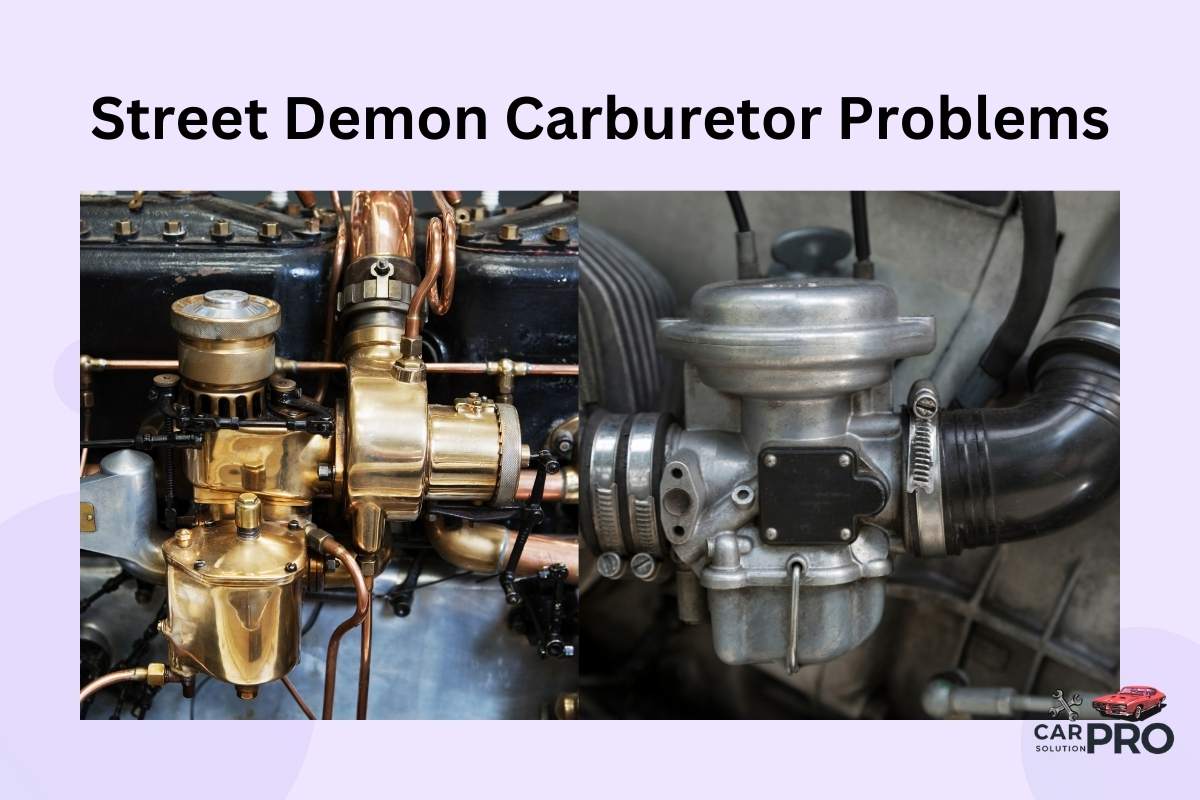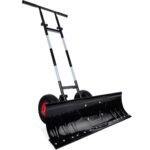Street Demon carburetors are popular among car enthusiasts for their performance and ease of use. Yet, some drivers face issues with these carburetors. Common problems include cars dying when overheated, fuel loss after sitting, and running rich at cruise speeds.
These issues can be frustrating, but many have simple fixes. For example, adjusting the fuel mixture or checking for leaks can often solve fuel delivery problems. Proper tuning is key to getting the best performance from a Street Demon carburetor.
Understanding these common problems and their solutions can help car owners keep their vehicles running smoothly. With the right knowledge, many Street Demon carburetor issues can be resolved at home, saving time and money on repairs.
Key Takeaways
- Street Demon carburetors may have issues with overheating, fuel loss, and rich running.
- Many problems can be fixed through proper adjustment and tuning.
- Regular maintenance helps prevent and resolve most Street Demon carburetor issues.
Identifying Common Issues with Street Demon Carburetors
Street Demon carburetors can experience several problems that affect vehicle performance. One frequent issue is the car dying when it overheats. This typically occurs when the engine temperature exceeds 210 degrees Fahrenheit.
Another common problem is fuel loss after the vehicle sits idle for a period of time. This can lead to starting difficulties and poor engine performance until the fuel system refills.
Some users report a secondary stumble when accelerating. This hesitation can impact smooth driving and may require adjustments to the carburetor settings.
Carburetors may also struggle with proper fuel flow, especially when using an electric fuel pump. This can result in inconsistent engine performance and potential stalling.
Street Demon carburetors might face challenges in high-performance applications. They may not be suitable for engines producing over 700 horsepower, as they can struggle to supply sufficient fuel.
To address these issues, owners can try:
- Adjusting the carburetor settings
- Checking and cleaning fuel lines
- Ensuring proper fuel pump pressure
- Verifying ignition timing
- Using a heat shield or spacer to reduce overheating
Regular maintenance and proper tuning can help prevent many common Street Demon carburetor problems.
Troubleshooting Fuel Delivery Problems
Fuel delivery issues can cause poor performance in Street Demon carburetors. These problems often stem from inconsistent fuel flow, clogged components, or incorrect float settings.
Inconsistent Fuel Flow
Inconsistent fuel flow can lead to sputtering and shaking when accelerating. Check the fuel pump pressure first. Street Demon carburetors need 5-6 psi for proper operation.
If pressure is correct, inspect the fuel lines for kinks or blockages. Replace any damaged lines. Clean the fuel filter if it’s clogged.
Consider the fuel pump type. Electric pumps should deliver 4-7 psi. Mechanical pumps may struggle to provide consistent flow at higher RPMs.
Test for vapor lock by running the engine with the hood open. If performance improves, heat shielding might be needed near fuel lines.
Clogged Jets or Passages
Dirt and debris can block fuel passages, causing rich or lean running conditions. Remove the carburetor top and visually inspect the main jets and idle feed restrictions.
Use carburetor cleaner and compressed air to clear any blockages. Be gentle to avoid damaging delicate parts.
Check the idle air bleeds if the engine runs poorly at low speeds. These small holes control fuel mixture from idle to about 2400 RPM.
Clean the idle transition circuit thoroughly. This system supplies fuel from idle to around 1900 RPM in most engines.
Improper Float Level
Incorrect float settings can cause flooding or fuel starvation. Street Demon carburetors have side-mounted floats, not front and back.
To check float level:
- Remove the carburetor bowl
- Measure from the cast line to the top of the float
- Adjust to 1 inch if needed
Bent or damaged floats won’t work properly. Replace them if you spot any issues.
Fuel leaks after sitting often point to float problems. A stuck or leaky needle valve can allow fuel to keep flowing when the engine is off.
If adjustments don’t solve the issue, consider replacing the entire float assembly.
Adjusting and Tuning Street Demon Carburetors
Street Demon carburetors need proper adjustment for optimal performance. Key areas to focus on are idle speed and air-fuel mixture. These adjustments help improve engine response and fuel efficiency.
Idle Speed Adjustments
The idle speed on a Street Demon carburetor can be adjusted without removing it from the vehicle. This makes the process easier for mechanics and DIY enthusiasts.
To adjust the idle speed:
- Locate the idle speed screw on the throttle lever
- Turn clockwise to increase speed
- Turn counterclockwise to decrease speed
It’s important to adjust both primary and secondary throttle plates when changing idle speed on four-barrel models. This ensures balanced performance across all barrels.
Proper idle speed helps prevent stalling and improves overall drivability. Aim for a smooth, steady idle without surging or hesitation.
Air-Fuel Mixture Tuning
Tuning the air-fuel mixture is crucial for engine performance and fuel economy. Street Demon carburetors allow for fine-tuning without removal from the engine.
To adjust the mixture:
- Locate the mixture screws (usually two on a four-barrel carb)
- Turn clockwise for a leaner mixture (less fuel)
- Turn counterclockwise for a richer mixture (more fuel)
Start with small adjustments, about 1/4 turn at a time. Listen for changes in engine sound and smoothness. A properly tuned mixture should result in a steady idle and responsive acceleration.
If the engine runs rough or stalls, the mixture may be too lean. If it runs sluggish or smells of fuel, it may be too rich. Aim for a balance between power and efficiency.
Overcoming Difficulties with Starting and Idle Stability
Street Demon carburetors can sometimes have issues with starting and maintaining a stable idle. These problems often stem from improper settings or mechanical issues. Let’s look at how to address common starting and idle problems.
Hard Starting Issues
Hard starting problems with Street Demon carburetors can be frustrating. One common cause is an improperly adjusted choke. Check that the choke is set correctly for your climate and engine.
Fuel delivery issues can also cause hard starts. Inspect the fuel lines and filter for clogs or leaks. Make sure the fuel pump is providing adequate pressure.
If the engine floods easily, the float level may be set too high. Adjust the float following the manufacturer’s specifications.
Ignition system problems can mimic carburetor issues. Check spark plugs, wires, and timing to rule out ignition-related starting difficulties.
Rough or Unstable Idle
An unstable idle is often caused by incorrect idle mixture settings. Adjust the idle mixture screws in small increments until the engine runs smoothly.
Vacuum leaks can create erratic idle behavior. Inspect all vacuum lines and gaskets for damage or loose connections.
The idle speed may need adjustment if it’s set too low or high. Aim for about 600-800 RPM in park or neutral for most applications.
A worn throttle shaft can cause air leaks and unstable idle. Check for excessive play in the throttle shaft and replace if necessary.
Proper timing and ignition system function are crucial for smooth idle. Verify that timing is set correctly and all ignition components are in good condition.
Resolving Throttle Response and Drivability Concerns
Street Demon carburetors can sometimes have issues that affect throttle response and drivability. These problems can show up as hesitation, poor throttle response, or backfiring. Let’s look at how to fix these common issues.
Hesitation or Stumble on Acceleration
Hesitation or stumbling when you press the gas pedal can be frustrating. This often happens because of a lean fuel mixture. To fix this, check the accelerator pump. Make sure it’s working right and spraying enough fuel.
If that’s not the problem, look at the idle circuit. Even if the car idles well, there might be issues when you open the throttle slowly. Adjust the idle mixture screws. Turn them in small amounts until the engine runs smoothly.
Another thing to check is the power valve. If it’s opening too late, it can cause hesitation. Try a power valve with a lower opening point.
Poor Throttle Response
Poor throttle response means the car doesn’t speed up quickly when you press the gas. First, make sure the throttle linkage is set up right. It should open the carburetor fully when you press the pedal all the way down.
Check the float level next. If it’s too high, it can flood the engine and cause slow response. Adjust it to the right height.
Look at the vacuum secondaries if you have them. They might need adjustment to open at the right time. If they open too late, the car will feel sluggish.
Backfiring or Popping
Backfiring or popping can be scary and damage your engine. It often means the fuel mixture is too lean. Check the main jets and make sure they’re the right size for your engine.
The ignition timing can also cause backfiring. Make sure it’s set correctly. If it’s too advanced, it can cause popping through the exhaust.
Another cause might be vacuum leaks. Check all the vacuum lines and the intake manifold gaskets. Even small leaks can cause big problems.
If you’ve checked all these things and still have issues, the carburetor might need a rebuild. Fresh gaskets and proper adjustment can solve many problems.
Frequently Asked Questions
Street Demon carburetors can experience various problems that affect engine performance. Tuning and fuel pressure issues are common areas that require attention. Proper diagnosis and adjustment are key to resolving carburetor troubles.
What are common symptoms of problems with the Street Demon carburetor?
Common symptoms include poor acceleration, engine overheating, and rich fuel mixture at idle. These issues can lead to reduced performance and increased fuel consumption.
Stalling or rough running may also indicate Street Demon carburetor problems. Drivers might notice hesitation or stumbling when accelerating.
How can tuning issues with the Street Demon 625 be identified and rectified?
Tuning issues often present as secondary stumble or hesitation. This can occur when the secondary throttle plates open during acceleration.
To rectify these issues, adjusting the secondary air valve spring tension may help. Checking and adjusting the float level is another important step in the tuning process.
What steps should be taken to properly lean out a Demon carburetor?
Leaning out a Demon carburetor involves adjusting the air-fuel mixture. Start by turning the mixture screws clockwise in small increments.
Monitor engine performance and exhaust gas color during the process. A slightly rough idle can indicate the mixture is becoming too lean.
What fuel pressure is required for optimal performance of a Demon carburetor?
Demon carburetors typically require 5-7 PSI of fuel pressure for optimal performance. Using an electric fuel pump can help maintain consistent pressure.
Too high or low fuel pressure can cause running issues. A fuel pressure regulator may be necessary to maintain the correct pressure.
What are the typical troubleshooting steps for diagnosing issues with carburetors?
Begin by checking for fuel leaks or blockages. Inspect the fuel filter and lines for any obstructions.
Examine the carburetor’s float level and adjust if necessary. Check the choke operation and ensure it opens fully when the engine warms up.
Can you provide advice on addressing tuning problems in the Holley Street Demon carburetor?
For Holley Street Demon carburetors, start by verifying the base idle mixture. Adjust the idle mixture screws to achieve the smoothest idle.
Check the accelerator pump function and adjust as needed. Ensure the vacuum secondary is operating correctly for smooth acceleration.
When you purchase a product through Amazon links on carsolutionpro.com, we may earn a small commission at no extra cost to you. This helps support the site and keep our content free. As an Amazon Associate, we earn from qualifying purchases made through our links.










